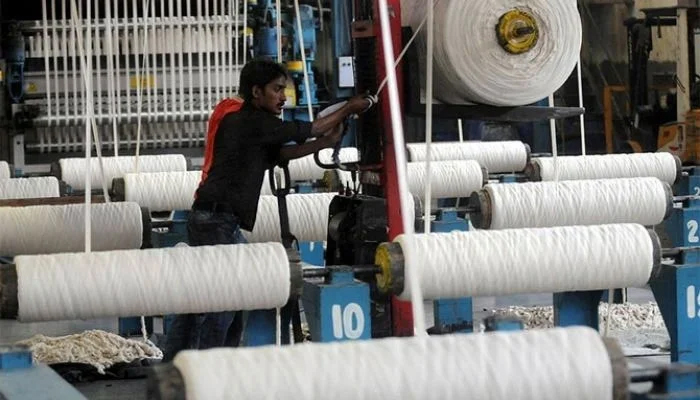Textile shift
LAHORE: In a surprising turn of events, Bangladesh, the rising star of Asia, experienced a decline in exports in the months of October and November - the same two months when Pakistan, the weakest economy in the region, recorded an increase in exports.
It appears that the reforms implemented in Pakistan over the past two years are finally bearing fruit, while Bangladesh's exporters are struggling to adapt to the new reality of rising power and gas prices, coupled with the added burden of higher minimum wages for their workers.
Pakistani entrepreneurs have faced similar challenges with high energy costs, but the weakened dollar has provided some respite. Additionally, following the increase in minimum wage in Bangladesh, Pakistan has become the cheapest source of labor in the textile industry.
The often-cited excuse of a global recession or the impact of the Russia-Ukraine war has been taken into account by all trading countries.
While demand is indeed low, it's worth noting that in the past two years, when the world, particularly the textile industry, was in a real recession, Bangladesh was the only country that managed to maintain its textile exports. It seems that this honeymoon period is now over.
In the past 18 months, the pattern of placing orders has shifted. Brands are now placing smaller orders, which do not align with the capacity of garment exporters from Bangladesh.
Bangladesh's textile sector has thrived on economies of scale. Processing smaller orders on their large-scale garment production lines is not commercially viable. Smaller factories in countries like Pakistan and India are better positioned to accept these orders.
This is driving buyers to these smaller markets. In Bangladesh, alone in Chittagong, 113 garment units have shut down in 2023 due to a lack of orders. More closures are expected in other regions. Recently, numerous factories in Dhaka's suburbs closed due to labor unrest. Many have not yet reopened following the minimum wage increase.
Textile exports from Pakistan are closely linked to the global textile market. Existing garment units must immediately start preparing to comply with the sustainable rules established by the European Union, where our textiles primarily go. By the end of this decade, green-certified factories will be favored suppliers.
The new legislation being implemented in the European Union will compel companies, whether based in the EU or not, to demonstrate their commitment to environmental protection and human rights. Pakistan is vulnerable on these issues, and some work needs to be done in this regard.
Other areas that require attention include economic issues. Interest rates are too high and should be lowered. This may not be possible until inflation is brought under control. The focus should be on value-added apparel sectors. Spinners are facing pressure worldwide.
Indian spinners are operating at reduced capacities. Spinning mills in Bangladesh and Vietnam have ceased operations. In Pakistan as well, numerous spinning mills have shut down. The majority of the remaining mills are operating far below capacity. This situation is likely to persist for some time before textile demand returns to normal.
-
 Laura Dern Reflects On Being Rejected Due To Something She Can't Help
Laura Dern Reflects On Being Rejected Due To Something She Can't Help -
 HBO Axed Naomi Watts's 'Game Of Thrones' Sequel For This Reason
HBO Axed Naomi Watts's 'Game Of Thrones' Sequel For This Reason -
 King Charles' Sandringham Estate Gets 'public Safety Message' After Andrew Move
King Charles' Sandringham Estate Gets 'public Safety Message' After Andrew Move -
 Brooklyn Beckham Plunges Victoria, David Beckham Into Marital Woes: ‘They’re Exhausted As It Seeps Into Marriage
Brooklyn Beckham Plunges Victoria, David Beckham Into Marital Woes: ‘They’re Exhausted As It Seeps Into Marriage -
 Lewis Capaldi Sends Taylor Swift Sweet Message After 'Opalite' Video Role
Lewis Capaldi Sends Taylor Swift Sweet Message After 'Opalite' Video Role -
 Sarah Ferguson Joins Andrew In ‘forcing’ Their Daughters Hand: ‘She Can Lose Everything’
Sarah Ferguson Joins Andrew In ‘forcing’ Their Daughters Hand: ‘She Can Lose Everything’ -
 'Bridgerton' Author Reveals If Actors Will Be Recast In Future Seasons
'Bridgerton' Author Reveals If Actors Will Be Recast In Future Seasons -
 50 Cent Super Bowl Ad Goes Viral
50 Cent Super Bowl Ad Goes Viral -
 'The Housemaid' Lifts Company's Profits: Here's How
'The Housemaid' Lifts Company's Profits: Here's How -
 Michael Douglas Recalls Director's Harsh Words Over 'Wall Street' Performance
Michael Douglas Recalls Director's Harsh Words Over 'Wall Street' Performance -
 Henry Czerny On Steve Martin Created Humor On 'Pink Panther' Set
Henry Czerny On Steve Martin Created Humor On 'Pink Panther' Set -
 Lady Victoria Hervey: Andrew Mountbatten-Windsor's Ex-girlfriend Proud Of Being On Epstein Files
Lady Victoria Hervey: Andrew Mountbatten-Windsor's Ex-girlfriend Proud Of Being On Epstein Files -
 Huawei Could Revive Chip Technology If US Lets Guard Down, Intel CEO Says
Huawei Could Revive Chip Technology If US Lets Guard Down, Intel CEO Says -
 Dolly Parton Created One Of Her Iconic Tracks With Acrylic Nails?
Dolly Parton Created One Of Her Iconic Tracks With Acrylic Nails? -
 Parents Alarmed As Teens Form Emotional Bonds With AI Companion Chatbots
Parents Alarmed As Teens Form Emotional Bonds With AI Companion Chatbots -
 Denzel Washington Surprises LeBron James
Denzel Washington Surprises LeBron James




